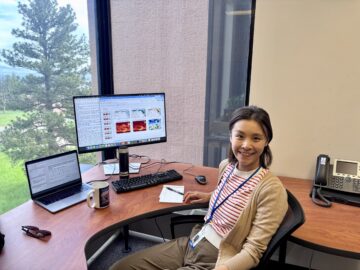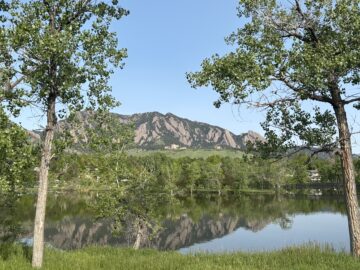Chasing Rain and Climate Clues in Colorado
July 18, 2025
Yan-Ning Kuo is a doctoral candidate in atmospheric science whose summer research is focused on understanding Southwestern U.S. precipitation changes primarily through work at the National Center for Atmospheric Research in Colorado.

Describe the location of your field research.
I am visiting the Mesa Lab of National Center for Atmospheric Research (NCAR) in Boulder, Colorado.
What’s the focus of your research?
My dissertation research is on understanding the North Pacific circulation and the Southwestern U.S. precipitation changes. I use a climate model developed by NCAR to disentangle the physical mechanism causing these changes to better understand the droughts in the Southwestern U.S.
What do you hope will be the impact of this work?
My research addresses a critical societal challenge: water security. Understanding how the Earth’s water cycle and regional hydroclimate change can inform water resource management strategies, benefiting policymakers, stakeholders, and societies.
How will field research advance your understanding of your research in a way that classes and/or theory do not?
This dissertation research visit to NCAR advances my academic excellence in various ways, especially by being connected with the NCAR climate model developers so that I get to know more about how to use this tool. In addition, NCAR is located in the Southwestern U.S., and I experienced how dry this region can be during its dry summer season.

What has surprised you about your experience?
NCAR hosts several workshops during the summer so it is always full of an energetic vibe with visitors from various domestic/international academic institutions. Another surprise is there are many hiking trails behind the Mesa Lab of NCAR so that we can get easy access to different lengths/levels/intensities of hike, ranging from 10 minutes to five hours.
How did Cornell programs and/or faculty mentors help connect you with the opportunity to carry out this research?
My advisor, Flavio Lehner, is partially affiliated with NCAR and I was connected through him to my NCAR host, Isla Simpson. The research travel grant provided by Cornell’s Graduate School helped me cover the financial expenses during this visit. The research travel grant also supported the continuation of my collaboration with Isla Simpson, who has been a collaborator on a recently published paper.
What would you say to students considering applying to Cornell for grad school?
Cornell’s Graduate School provides various support for graduate students’ growth. I feel supported by my graduate school experience at Cornell and am equipped to advance science in a high socioeconomic impact field.
